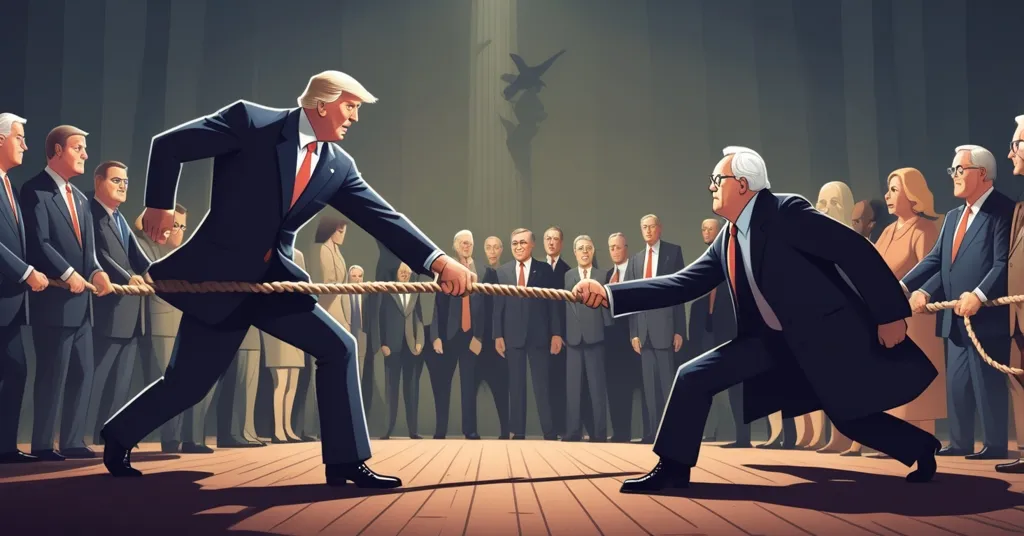MoonPay CEO Advocates for State Control of Stablecoins Amid Federal Legislation Push

MoonPay CEO Urges Congress to Preserve State Authority Over Stablecoins Amid Legislative Push
In a bold move, MoonPay CEO Ivan Soto-Wright has urged Congress to maintain state-level control over stablecoins, amidst a heated legislative battle. Stablecoins are cryptocurrencies designed to have a stable value, often pegged to a fiat currency like the US dollar.
- MoonPay CEO advocates for state regulation of stablecoins.
- GENIUS and STABLE Acts progress in Congress.
- Trump-backed World Liberty Financial launches USD1 stablecoin.
Ivan Soto-Wright, the CEO of cryptocurrency payment firm MoonPay, has made a compelling case to the U.S. Congress to keep stablecoin regulation at the state level. Amidst the ongoing legislative efforts to establish a federal framework for stablecoins, Soto-Wright’s plea highlights the critical role state regulators play in maintaining clarity and consumer protection within the crypto sector.
MoonPay CEO’s Stance
Soto-Wright argues for the preservation of state-level regulatory authority over stablecoins. He emphasizes that state regulators have been instrumental in providing the necessary regulatory clarity and consumer safeguards that the industry needs. “While the cryptocurrency industry has called for federal legislation for years, it has been these state regulators who have provided and continue to provide regulatory clarity and supervision to ensure consumer protection and enable growth in the sector,” Soto-Wright stated.
MoonPay itself operates under 46 state money transmitter licenses and serves over 30 million users, showcasing how state regulation can effectively manage the complexities of crypto payment services. This real-world example supports Soto-Wright’s argument that state-level authorities have the experience and capacity to regulate stablecoins effectively.
Legislative Developments
As federal legislation looms on the horizon with the introduction of the GENIUS Act in the Senate and the STABLE Act in the House, the crypto community is watching closely. The GENIUS Act, a proposed law in the Senate aimed at regulating stablecoins, defines payment stablecoins and sets requirements for issuers, including reserve holdings and reporting obligations. It also outlines a dual federal-state regulatory regime, allowing issuers with less than $10 billion in issuance to opt for state regulation if the state regime is “substantially similar” to federal standards. The STABLE Act, introduced in the House, aims to establish a comprehensive federal regulatory framework for stablecoins. Both bills have been advanced by their respective committees for a full floor vote, but it is unclear if they have the necessary votes to pass both chambers.
The Conference of State Bank Supervisors (CSBS) supports maintaining state-level regulation to complement federal efforts. This approach could create a balanced regulatory environment where both state and federal authorities work in tandem to oversee stablecoin operations and issuances.
Political Involvement in Stablecoins
Adding another layer to this complex regulatory environment is the recent launch of a new stablecoin backed by political heavyweights. World Liberty Financial, backed by the Trump family, launched the USD1 stablecoin in September 2024. The Trump family holds a 60% stake in the controlling entity of World Liberty and is entitled to a substantial portion of the project’s revenues. The firm has raised approximately $600 million from investors including Justin Sun, DWF Labs, Oddiyana Ventures, and Web3Port. As of March 24, 2024, the USD1 stablecoin was not yet tradable, raising questions about its viability and the potential conflicts of interest given the political affiliations of its backers.
The centralized governance structure of World Liberty Financial, where the Trump family holds significant influence, contrasts sharply with the decentralized ethos that underpins much of the crypto industry. Critics argue that such centralization could undermine the principles of DeFi and raise issues of influence peddling and conflicts of interest. In the world of crypto, where everything is supposed to be decentralized, having a stablecoin backed by the Trump family feels like inviting Uncle Sam to the blockchain party.
Counterpoints and Analysis
While state regulation has its merits, critics argue that a patchwork of state laws could hinder the growth and uniformity of the crypto industry. Federal regulation could provide stronger consumer protection and ensure consistency across states. The debate over stablecoin regulation is not just about control but also about the future of the crypto ecosystem, which relies on stablecoins for liquidity and as a bridge between traditional finance and decentralized finance.
Historically, the push for stablecoin regulation has been driven by concerns over consumer protection and financial stability. The introduction of the GENIUS and STABLE Acts reflects a broader trend of governments seeking to establish frameworks for digital assets, highlighting the tension between federal and state regulatory powers.
Key Takeaways and Questions
- What is Ivan Soto-Wright’s stance on stablecoin regulation?
Ivan Soto-Wright supports maintaining state-level regulatory authority over stablecoins, emphasizing the role of state regulators in providing clarity and consumer protection.
- What are the key legislative efforts mentioned?
The key legislative efforts are the GENIUS Act in the Senate and the STABLE Act in the House, both aimed at establishing a federal regulatory framework for stablecoins.
- How does the Conference of State Bank Supervisors view stablecoin regulation?
The Conference of State Bank Supervisors supports a state-level approach to stablecoin regulation, aligning with Ivan Soto-Wright’s stance.
- What is the status of the GENIUS and STABLE Acts?
Both the GENIUS and STABLE Acts have been advanced by their respective committees for a full floor vote, but it is unclear if they have the necessary votes to pass both chambers.
- What is the involvement of the Trump family in the stablecoin market?
The Trump family has backed World Liberty Financial, which launched the USD1 stablecoin, raising concerns about potential conflicts of interest and legislative complications.
- Who are the investors in World Liberty Financial?
Investors in World Liberty Financial include Justin Sun, DWF Labs, Oddiyana Ventures, and Web3Port.
- What is the current status of the USD1 stablecoin?
As of March 24, 2024, the USD1 stablecoin was not tradable.
- What does this mean for the average crypto user?
The regulatory debate could impact the stability and usability of stablecoins, potentially affecting how crypto users transact and interact with DeFi platforms.
- How might this affect the future of decentralized finance (DeFi)?
A shift towards more centralized control over stablecoins could challenge the decentralized principles of DeFi, potentially leading to a more regulated but less innovative space.



